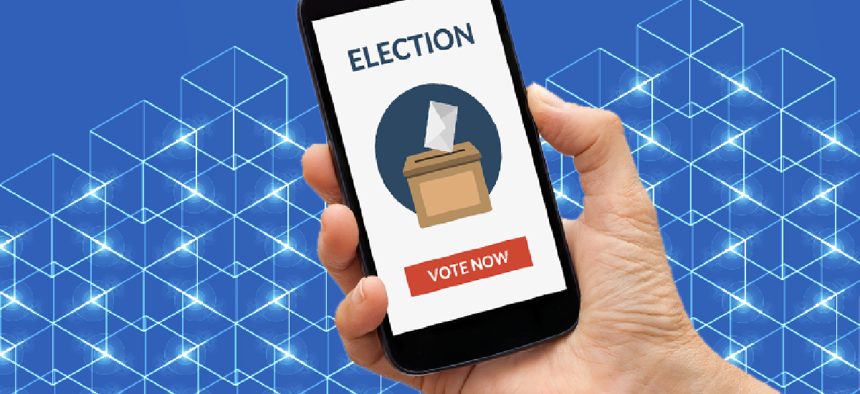How blockchain-secured voting works

The West Virginia Secretary of State’s office explains how the first statewide blockchain voting pilot for overseas voters came together.
West Virginia Secretary of State Mac Warner charged his elections team with finding a way to make voting in the 2018 presidential election easier for service members and overseas citizens. After working through a blockchain-based voting pilot, 144 West Virginia voters living abroad were able to cast their ballots through their mobile phones last November.
According to a 2018 report by the Federal Voting Assistance Program, only 6.9 percent of eligible service members and overseas citizens cast a ballot in the 2016 elections; Warner wanted to change that paradigm. Warner’s son, who was deployed in Italy and registered to vote in Monongalia County, cast the first ballot in the initial test of the blockchain-based solution ahead of the state’s primary elections in May 2018.
“Having had trouble voting from deployed locations around the world during my 28 years of military and State Department contracting service, upon taking office I vowed to find ways to help West Virginia soldiers vote,” Warner wrote in an op-ed published in the Charleston-Gazette Mail after the primary. “As much as anyone, the people who put their lives on the line to protect our way of life deserve to have a voice in selecting the leaders who send them into harm’s way. With West Virginia’s leading-edge mobile device voting, we have done just that.”
The first test of the system in West Virginia’s primary elections only involved service members from Harrison and Monongalia counties who qualified under the Uniformed and Overseas Citizens Absentee Voting Act (UOCAVA). The Secretary of State’s office partnered with Tusk Holdings to fund the effort.
New America’s Blockchain Trust Accelerator vetted two blockchain-based solutions from two companies -- Voatz and Votem -- to determine which one made the most sense for UOCAVA voters. Tusk Holdings chose Voatz to conduct the experiment for the 2018 West Virginia primary and general elections.
Overseas voters were able to cast their votes through a mobile app that verified their identities by scanning a driver’s license, state ID or passport along with a selfie. Once the identity was confirmed, voters were able to make their selections through the mobile voting app based on the ballot that they would normally use on Election Day at their local precinct. Voters were given a unique ID or hash that, once the vote was cast, allowed them to write on to the blockchain and gave them the ability to change their votes (called ballot spoiling). Each submission to the blockchain was encrypted and submitted to the blockchain ledger, which gave election clerks the ability to conduct post-election audits.
After the initial test in the primary, the Secretary of State’s office recognized that improvements needed to be made to expand the pilot program to all West Virginia counties, and it outlined the improvements in a white paper submitted to the National Association Secretaries of State on Feb. 2. First, four independent security auditors were selected to thoroughly vet the results from the primary including conducting penetration testing and reviewing the iOS and Android source code, blockchain infrastructure and Voatz’s corporate procedures.
To allow all counties to participate, the Secretary of State’s office needed to figure out a way to program the different ballot styles into the primary voting system. It increased the number of blockchain servers from 16 to 32 split over multiple geographic locations in the U.S. to boost performance and security. A new method to allow voters to change or spoil their ballot selections ahead of an election was also needed so a second ballot could be issued to a voter and only the last ballot submitted by each voter would be counted.
The last component changed between the primary and general elections was the preparation and tabulatable ballots. In the primary elections, the mobile app ballots had to be manually transcribed by the clerks. For the midterms, a system was developed to allow clerks to automatically print ballots that could be inserted directly into ballot tabulating machines.
Of 183 eligible voters, there were 144 ballots cast in the primary election from 24 participating counties, which was declared a success by the Secretary of State’s office. The Voatz app was also downloaded by more than 200 voters in West Virginia who were not UOCAVA voters or in the 24 participating counties and therefore not eligible to participate in the pilot program.
Despite the success of the pilots, Deak Kersey, director of elections and deputy legal counsel at the Secretary of State’s office, said there were no plans to expand the technology to absentee voters or regular voters who cast their ballots at polling places. With the rapid pace of technological innovation, the office also isn’t sure whether it will use the blockchain-based technology for UOCAVA voters in future elections.
“Our secretary will be the first to tell you that we are still very skeptical of the technology and where it could lead,” Kersey said. “This is for military and overseas citizens, which is a very small knit community," he said. “We are trying to serve a specific population by doing this experiment.”
Nevertheless, the Secretary of State’s office is looking into how to work with a vendor inside the agency’s procurement environment while still meeting state laws to expand the pilot program to include more West Virginia counties in the 2020 elections. There are also ongoing discussions with other states that are interested in conducting similar pilot programs for UOCAVA voters.
“Other secretaries of state agree that there is a huge problem with the way that we treat our military,” Kersey said. “Just because something is hard doesn’t mean that we shouldn’t try to fix it, and they agree with that.”





